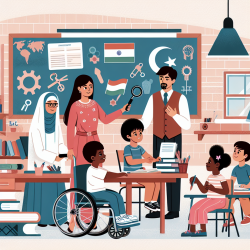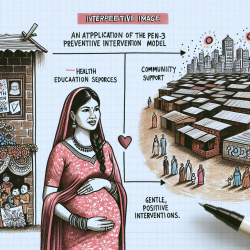In the realm of special education and disability services, adopting a rights-based approach can significantly enhance the quality of life for children with disabilities. This approach emphasizes the importance of recognizing children not merely as recipients of care but as individuals with distinct rights. A recent research study titled "Evidence-informed stakeholder consultations to promote rights-based approaches for children with disabilities" sheds light on how practitioners can integrate these approaches into their work effectively.
The Importance of Rights-Based Approaches
Rights-based approaches prioritize the dignity and autonomy of individuals with disabilities. They align with international treaties like the United Nations Convention on the Rights of the Child (CRC) and the Convention on the Rights of Persons with Disabilities (CRPD), which advocate for non-discrimination, participation, and equal opportunities for children with disabilities.
Implementing these approaches requires a shift in perspective—from viewing children as passive recipients of services to recognizing them as active participants in their own lives. This shift can lead to more inclusive policies and practices that better meet the needs of children and their families.
Stakeholder Consultations: A Pathway to Effective Implementation
The research study utilized a multi-level stakeholder consultation process involving researchers, grassroots organizations, caregivers, youth with disabilities, and decision-makers. This participatory action research highlighted several key outcomes:
- Human Rights Impact: Stakeholders emphasized that human rights approaches have a tangible impact on daily living. Organizations valued these approaches for measuring policy outcomes, while parents prioritized service provision and youth focused on accessibility.
- Cross-Sector Collaboration: The study underscored the need for collaboration across sectors to implement rights-based approaches effectively. This includes engaging various stakeholders in dialogue to ensure that policies are informed by the lived experiences of those they affect.
- Practical Solutions: Stakeholders identified practical solutions such as measuring inclusion in communities as an indicator of success and using international human rights guidelines to guide services.
Practical Steps for Practitioners
For practitioners looking to improve their skills and practices through rights-based approaches, consider the following steps:
- Engage in Continuous Learning: Stay informed about the latest research and best practices in rights-based approaches through conferences, webinars, and publications.
- Foster Inclusive Environments: Work towards creating educational settings that are free from discrimination and accessible to all students. Encourage adaptive equipment use and sensitization programs within classrooms.
- Advocate for Policy Change: Use your position to advocate for policies that support the inclusion and participation of children with disabilities in public life. Engage in policy dialogues and consultations to ensure that your voice is heard.
- Collaborate Across Sectors: Build partnerships with other organizations, families, and community groups to create a network of support that amplifies the impact of your work.
The Road Ahead
The journey towards fully implementing rights-based approaches is ongoing. It requires commitment from all stakeholders involved—practitioners, policymakers, families, and communities—to create an environment where children with disabilities can thrive.
To delve deeper into this topic and explore the original research findings, please follow this link: Evidence-informed stakeholder consultations to promote rights-based approaches for children with disabilities.










